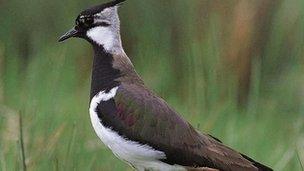RSPB fears for curlew and lapwing in Northern Ireland after "cuts"
- Published

The RSPB has concerns over the lapwing's future in Northern Ireland
The director of the RSPB in Northern Ireland has said he fears the curlew could be extinct in the country within a decade.
He also fears the lapwing will be in terminal decline if the Department of Agriculture does not address financial cuts to the countryside management scheme.
The scheme provides grants to landowners for adopting farming practices that enhance the countryside.
It is delivered by the department.
James Robinson, who is director of the RSPB in Northern Ireland, said the scheme helped birds such as the lapwing and curlew which were "red-listed or threatened species".
However, he said a continued reduction in funding could have serious consequences for their future.
"In recent years, farmers have used the grants to help wildlife and they are popular grants," he said.
He said he had estimated that since 2010, about £40m has been cut from Northern Ireland's countryside management scheme.
"This means that farmers who want to join the scheme cannot do so," he added.
"Without the farmers doing the work, birds such as the curlew and the lapwing face an uncertain future.
"There is a possibility that the curlew, an iconic bird in Ireland, could be extinct in Northern Ireland in 10 years.
"The lapwing could also go into terminal decline if there is not sufficient grants for farmers."
Mr Robinson said he wanted "the minister and the department to listen to conservationists who want to see taxpayers' money supporting wildlife-friendly farming schemes now and in the future".
The Department of Agriculture and Rural Development said it was proceeding with a smaller number of new agri-environment agreements than the 1,300 originally planned for 2013.
It said the focus would be on applicants that have farms with designated land that is of high environmental value as well as applications deferred from 2012.
A spokesman said: "There are some issues with the delivery of the scheme both from a farmer and a departmental perspective that we need to adjust before seeking to increase the number of applicants further."